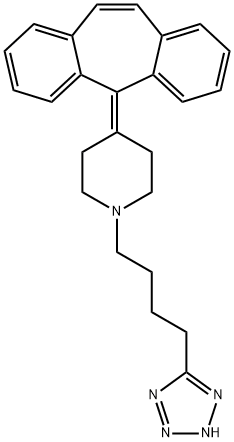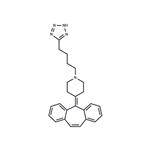AT-56 is an orally active inhibitor of Lipocalin-type prostaglandin D synthase.
AT-56 is a selective orally active inhibitor of lipocalin-type prostaglandin D synthase (L-PGDS), one of two synthases involved in the production of Prostaglandin D2 (PGD2) from arachidonic acid. PGD2 is a lipid signaling molecule, which activates two receptors, DP1 involved in centrally mediated processes such as sleep and pain, and DP2 involved and inflammation. The two PGD synthases involved in its synthesis are hematopoietic (H-PDGS) and lipocalin-type (L-PGDS), which acts to form PGD2 in the CNS and other systems but not in inflammatory cells/tissues. AT-56 binds competitively at the enzymeμs catalytic pocket, and has no effect on the production of other PGs or H-PDGS-catalyzed PDG2. AT-56 inhibited PGD2 production by L-PGDS-expressing human TE-671 cells with an IC50 value of 3 μM without affecting production of PGE2 and PGF2, but had no effect on the PGD2 production by H-PGDS-expressing human megakaryocytes.
AT-56 (1-30 μM; 10 minutes) dose-dependently inhibits the production of PGD2 in L-PGDS-expressing human medulloblastoma TE-671 cells with an IC50 of about 3 μM.
AT-56 (1-30 mg/kg; p.o.) suppresses the PGD2 production in the stab-wounded brain.
AT-56 (1-10 mg/kg; p.o.) suppresses the L-PGDS-mediated allergic airway inflammation in mice.
AT-56 (10 mg/kg; p.o.) exhibits Cmax (2.15 μg/ml), half-life (1.71 h) and high oral bioavailability (82%).


![4-(5H-Dibenzo[a,d]cyclohepten-5-ylidene)-1-[4-(2H-tetrazol-5-yl)butyl]-piperidine pictures](https://img.chemicalbook.com/ProductImageEN/2019-9/Small/d330a174-c4e0-491b-b584-ffde058fc907.png)